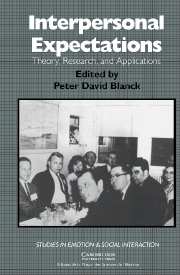Book contents
- Frontmatter
- Contents
- Preface
- List of contributors
- Introduction
- Part I Research on interpersonal expectations
- Part II Research on the mediation of interpersonal expectations through nonverbal behavior
- Part III The study of interpersonal expectations
- 17 The methodological imagination: Insoluble problems or investigable questions?
- 18 Issues in studying the mediation of expectancy effects: A taxonomy of expectancy situations
- 19 Analysis of variance in the study of interpersonal expectations: Theory testing, interaction effects, and effect sizes
- 20 Statistical tools for meta-analysis: From straightforward to esoteric
- 21 The volunteer problem revisited
- 22 Assessment and prevention of expectancy effects in community mental health studies
- 23 Comment: Never-ending nets of moderators and mediators
- Author index
- Subject index
- Studies in Emotion and Social Interaction
18 - Issues in studying the mediation of expectancy effects: A taxonomy of expectancy situations
from Part III - The study of interpersonal expectations
Published online by Cambridge University Press: 23 December 2009
- Frontmatter
- Contents
- Preface
- List of contributors
- Introduction
- Part I Research on interpersonal expectations
- Part II Research on the mediation of interpersonal expectations through nonverbal behavior
- Part III The study of interpersonal expectations
- 17 The methodological imagination: Insoluble problems or investigable questions?
- 18 Issues in studying the mediation of expectancy effects: A taxonomy of expectancy situations
- 19 Analysis of variance in the study of interpersonal expectations: Theory testing, interaction effects, and effect sizes
- 20 Statistical tools for meta-analysis: From straightforward to esoteric
- 21 The volunteer problem revisited
- 22 Assessment and prevention of expectancy effects in community mental health studies
- 23 Comment: Never-ending nets of moderators and mediators
- Author index
- Subject index
- Studies in Emotion and Social Interaction
Summary
The expectations we hold of other people can act as self-fulfilling prophecies. A major component of research on interpersonal expectancy effects addresses the behavioral processes underlying this phenomenon. How are perceivers' expectations communicated to targets so as to create a self-fulfilling prophecy? Oddly, although expectancy mediation has been such a major question in this area of research, it remains the most glaring gap in our knowledge, especially at the theoretical level.
The problem is not that data on expectancy mediation do not exist; most studies in this area address mediation to some extent. Rather, as Bob Rosenthal and I noted in our meta-analysis of the mediation literature, the great weakness was the lack of a coherent, theoretically meaningful organization of the mediating behaviors that had been studied, as well as a lack of understanding of how the mediators fit into the wider expectancy process (Harris & Rosenthal, 1985). With the exception of Rosenthal's (1989) affect-effort theory of expectancy mediation, practically nothing had been done since 1985 to remedy these weaknesses.
The major obstacle to developing a comprehensive theory of expectancy mediation is that the behaviors exhibited by perceivers will necessarily depend on the situational context and the nature of the expectancy manipulation. The mediation of teacher expectancy effects will be different from the mediation of expectancy effects in a getting-acquainted situation, because the role demands and situational constraints for the two contexts differ.
- Type
- Chapter
- Information
- Interpersonal ExpectationsTheory, Research and Applications, pp. 350 - 378Publisher: Cambridge University PressPrint publication year: 1993
- 15
- Cited by



